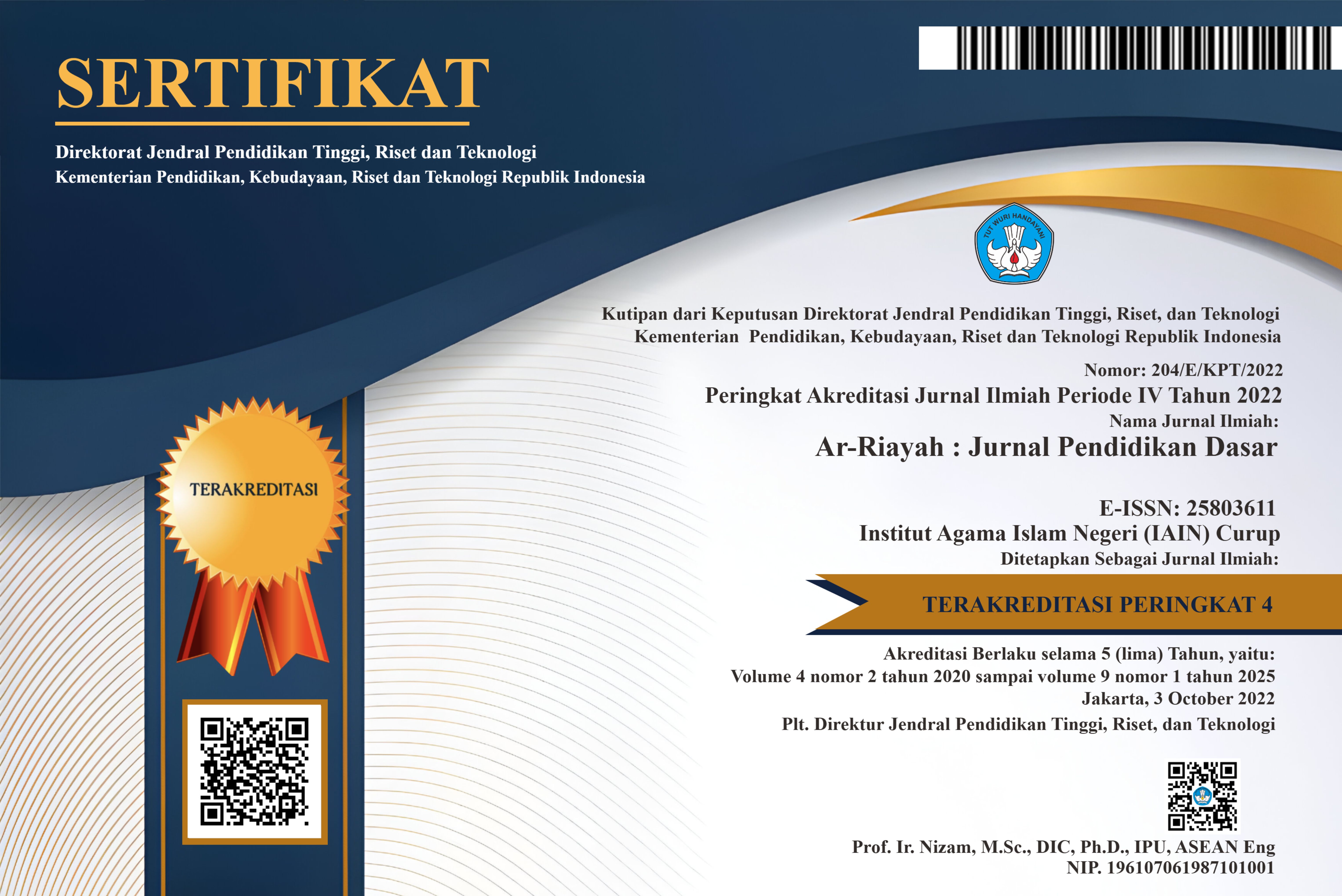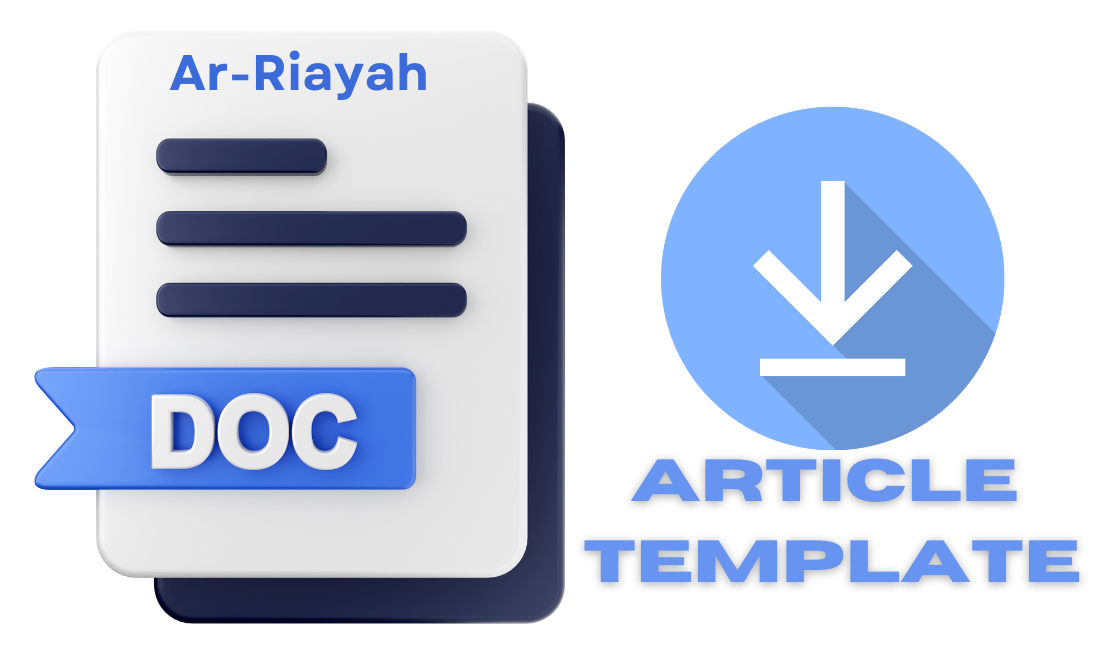Analisis Pemahaman Siswa Kelas Rendah Terhadap Konsep Perkalian pada Pembelajaran Tematik Terpadu di SD/MI
DOI:
https://doi.org/10.29240/jpd.v5i2.3027Keywords:
Multiplication Concept, Integrated ThematicAbstract
The background of this research is due to the lack of understanding of low-grade students regarding the concept of multiplication in thematic subjects. The purpose of this study was to determine the level of understanding of low grade students in understanding the concept of multiplication. This study uses a qualitative method, by examining data sources from several students. In addition, the researchers also conducted a literature study on several sources of books and articles to enrich the information. The sample in this study were 15 low-grade students. The instrument used is a test to measure the knowledge and abilities of students. The data obtained were then processed and analyzed using descriptive qualitative analysis techniques. The results showed that: (1) The average value of understanding 15 students about the basic concept of multiplication was 67.33%; (2) The lack of inculcation of the basic concept of multiplication counting operations is not carried out early on; (3) Students' skills in understanding the basic method of multiplication are still lacking; (4) The achievement and encouragement of students in learning on multiplication operations is still low.
Downloads
References
Ananda, Rizki, dan Fadhilaturrahmi. “Analisis Kemampuan Guru Sekolah Dasar Dalam Implementasi Pembelajaran Tematik di SD.†Jurnal Basicedu: Research & Learning in Elementary Education 2, no. 2, 2018.
Desyandri, Desyandri, Muhammadi Muhammadi, Mansurdin Mansurdin, dan Rijal Fahmi. “Development of Integrated Thematic Teaching Material Used Discovery Learning Model in Grade V Elementary School.†Jurnal Konseling dan Pendidikan IICET Indonesian Institute for Counseling, Education, and Theraphy 7, no. 1, 2019.
Husna, Asmaul. “The Training Use Of Jarimatika Method To Inculcate The Easy Way Of Calculating Skill Of Elementary School Students in RW. 01 Kibing Area.†Minda Baharu E-ISSN 2614-5944 1, 2017
Jarmita, Nida. “Kesulitan Pemahaman Konsep Matematis Siswa Dalam Pembelajaran Matematika di Kelas Awal Sekolah Dasar.†PIONIR: Jurnal Pendidikan 4, no. 2, 2015.
Kawuryan, Sekar Purbarini. “Karakteristik Siswa SD Kelas Rendah dan Pembelajarannya,†n.d. http://staffnew.uny.ac.id/upload/132313274/pengabdian/Karakteristik+Dan+Cara+Belajar+Siswa+SD+Kelas+Rendah.pdf.
Komalasari, Mahilda Dea, dan Bayu Pamungkas. “Meningkatkan Pemahaman Konsep Perkalian dan Pembagian Menggunakan Multimedia Interaktif Berbasis Multisensoris pada Siswa Berkesulitan Belajar.†Elementary School p-ISSN 2338-980X e-ISSN 2502-4264 6, no. 1, 2019.
Kurniawan, Dedi, Karlimah, dan Yusuf Suryana. “Penerapan media komik matematika terhadap peningkatan pemahaman konsep perkalian dan pembagian bilangan cacah di sekolah dasar.†JPBM: Jurnal Penelitian Pendidikan dan Pengajaran Matematika 1, no. 1, 2015.
Lerner, Janet. Learning Disabilities: Theories, Diagnosis, and Teaching Strategies. New Jersey: Hpugton Mifflin, 1998.
Maharani, Isma Nastiti. “Model Pengembangan Bahan Ajar Matematika Untuk Sekolah Dasar.†Vox Edukasi: Jurnal Ilmiah Ilmu Pendidikan 8, no. 1 2017.
Marthen, Tapilouw. Pengajaran Matematika di Sekolah Dasar dengan Pendekatan CBSA. Bandung: Sinar Baru, 1991.
Maulana, Ihsan, Yaswinda, dan Nurhamidah Nasution. “Pengenalan Konsep Perkalian Menggunakan Media Rak Telur Rainbow pada Anak Usia Dini.†Jurnal Obsesi: Jurnal Pendidikan Anak Usia Dini 4, no. 2, 2020.
Mustofa, Mohammad Khoirul. “The Effectiveness Of Using Everyone Is A Teacher Here Model On Thematic Learning Outcome.†Proceeding Internasional Seminar of Primary Education 2, 2019.
Mutaqin, Ejen Jenal. “Analisis Learning Trajectory Matematis dalam Konsep Perkalian Bilangan Cacah di Kelas Rendah Sekolah Dasar.†Dwija Cendekia: Jurnal Riset Pedagogik 1, no. 1, 2017.
Pambudi, Bayu. “The Use of Cooperative Script Method Based on Local Culture in the Thematic Lesson.†Proceeding International Seminar of Primary Education 2, 2019.
“Pendidikan Dasar.†Diakses 23 Juni 2021. http://siln-riyadh.kemdikbud.go.id/pendidikan-dasar/.
Prastowo, Andi. Analisis Pembelajaran Tematik Terpadu. Jakarta: Kencana-PrenadaMedia Group, 2019.
Pratama, Tonny Rimba. “Using Word Square in Teaching Thematic Learning.†Proceeding International Seminar of Primary Education 2, 2019.
Putra, Angga Tri Cahya. “The Effectiveness Of Group To Group Exchange With Visual Media In Thematic Learning Outcomes.†Proceeding Internasional Seminar of Primary Education 2, 2019.
Sari, Novika Auliyana, Sa’dun Akbar, dan Yuniastuti. “Penerapan Pembelajaran Tematik Terpadu di Sekolah Dasar.†Jurnal Pendidikan: Teori, Penelitian, dan Pengembangan 3, no. 12, 2018.
Sugiyono. Metode Penelitian Kuantitatif Kualitatif dan R&D. Bandung: Alfabeta, 2013.
Sulistiani, Ika Ratih. “Pembelajaran Matematika Materi Perkalian Dengan Menggunakan Media Benda Konkret (Manik –Manik Dan Sedotan) Untuk Meningkatkan Hasil Belajar Siswa Kelas 2 SD Dinoyo 1 Malang.†Jurnal Ilmiah Vicratina: Jurnal Kependidikan Dan Keislaman FAI Unisma 10, no. 2, 2016.
Suryosubroto. Proses Belajar Mengajar di Sekolah. Jakarta: Rineka Cipta, 2009.
Suyanto, Slamet. Konsep Dasar Pendidikan Anak Usia Dini. Jakarta: Depdiknas, 2005.
Syaifuddin, Mohammad. “Implementasi Pembelajaran Tematik di Kelas 2 SD Negeri Demangan Yogyakarta.†Tadris: Jurnal Keguruan dan Ilmu Tarbiyah 02, no. 2, 2017.
Downloads
Published
How to Cite
Issue
Section
Citation Check
License
Authors who publish with Ar-Riayah: Jurnal Pendidikan Dasar agree to the following terms:
Authors retain copyright and grant the journal right of first publication with the work simultaneously licensed under a Creative Commons Attribution-NonCommercial-ShareAlike 4.0 International License (CC BY-NC-SA 4.0) that allows others to share the work with an acknowledgment of the work's authorship and initial publication in this journal.
Authors are able to enter into separate, additional contractual arrangements for the non-exclusive distribution of the journal's published version of the work (e.g., post it to an institutional repository or publish it in a book), with an acknowledgment of its initial publication in this journal.
- Authors are permitted and encouraged to post their work online (e.g., in institutional repositories or on their website) prior to and during the submission process, as it can lead to productive exchanges, as well as earlier and greater citation of published work (See The Effect of Open Access).










